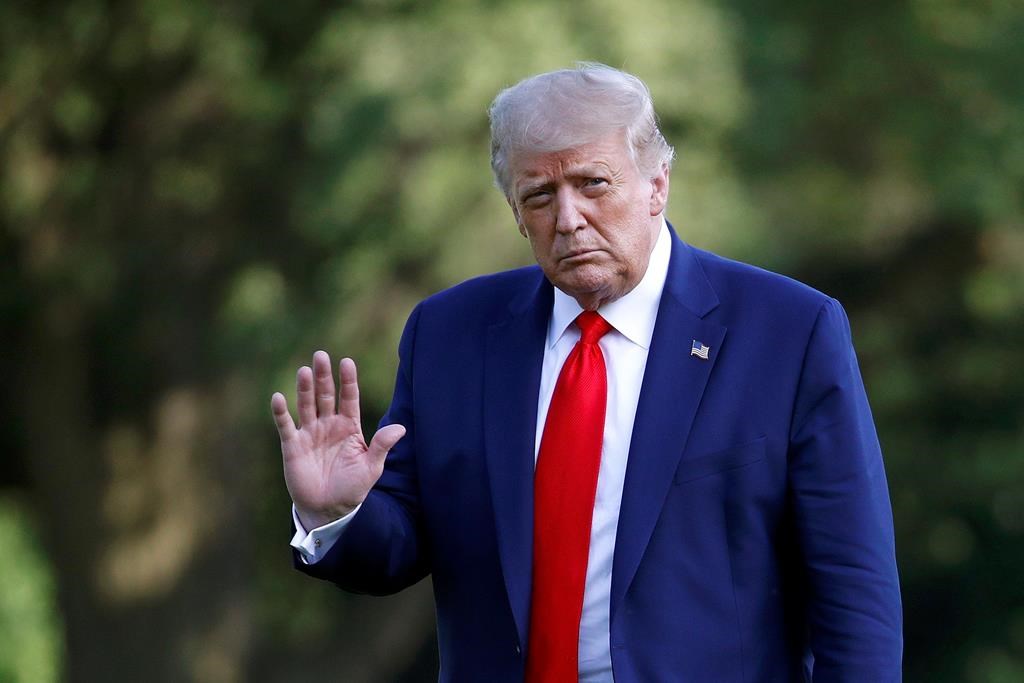It’s hard to overstate the scale of the crisis facing the United States.

Nearly 140,000 Americans are dead, more than 51 million are unemployed, and there is no end to the novel coronavirus pandemic in sight.
Things are undoubtedly going to get worse in the weeks ahead.
READ MORE: After Trump shakes up staff, Kushner remains driving force behind campaign
Week after week, the U.S. is setting new records for overall infections. Hospitalizations and deaths are setting records in various states. Testing problems mean the virus is likely spreading unchecked, and tens of thousands of layoffs are shifting from temporary to permanent, just as eviction protections and emergency benefits run out.
Faced with a once-in-a-generation catastrophe, U.S. President Donald Trump has adopted a clear strategy: talk about anything else.
After making himself the face of the pandemic fight in its early days, Trump has moved on to other things.
Despite still holding public events, the president rarely mentions the virus, except to claim that things are going “very well,” or to blame China, or to claim that the 3.5 million detected cases are largely the result of increased testing.
He has not revealed anything new about a federal strategy. He has not adopted a new style of leadership on the matter, except to watch as his trusted advisors attack Dr. Anthony Fauci, the top infectious disease expert in the U.S.

Trump has instead opted to focus on issues far afield, like the removal of Confederate statues or promoting a brand of beans, as if those things are gnawing at the minds of Americans.
On Thursday, when the U.S. recorded a record-setting 77,255 new cases of COVID-19, Trump held a White House event to talk about rolling back government regulations, surrounded by cranes and pickup trucks as props.

Get daily National news
The singular issue of most concern in the country is seemingly off the radar at the White House.
To put this in context, imagine if former president George W. Bush had made a sudden pivot to focus on the issue of Confederate monuments in December 2001.
Picture former president Franklin Roosevelt quickly moving on from the decimation of Pearl Harbour, as though it hadn’t happened.
We don’t know why Trump has adopted this head-in-the-sand strategy.

Perhaps he fears that talking about the virus would remind Americans of the nation’s relatively poor response compared to a long list of other countries.
Perhaps he feels he can solidify his shrinking base by playing to specific issues.
Whatever the answer, it is undoubtedly harming his own self-interests.
A Washington Post-ABC poll found 60 per cent of respondents disapprove of the way Trump is handling the coronavirus crisis, compared to 38 per cent who approve. That’s down from 51 per cent approval in March.
- Tumbler Ridge B.C. mass shooting: What we know about the victims
- ‘We now have to figure out how to live life without her’: Mother of Tumbler Ridge shooting victim speaks
- There are changes coming to Tim Hortons menus and stores soon
- Oysters from Stellar Bay Shellfish brand recalled for norovirus risk
That same poll found 63 per cent feel it’s more important to control the virus, even if it hurts the economy — running counter to Trump’s initial push to reopen at all costs. And 66 per cent said they are worried about themselves or a family member contracting the virus — all while Trump keeps talking about statues and beans.
READ MORE: Republicans to limit national convention crowd as coronavirus overwhelms Florida
The disconnect isn’t the only problem.
Some 62 per cent of respondents to a Quinnipiac poll said that Trump is personally hurting efforts to slow the spread of the virus. In that same poll, 67 per cent say they do not trust the information coming from Trump about the pandemic.
Like the pandemic itself, it’s hard to see how things get any better for Trump.
A sudden presidential interest in quashing the virus would still not end the outcomes of more death and economic dismay that are now baked-in.
Jackson Proskow is Washington bureau chief for Global National.









Comments
Want to discuss? Please read our Commenting Policy first.